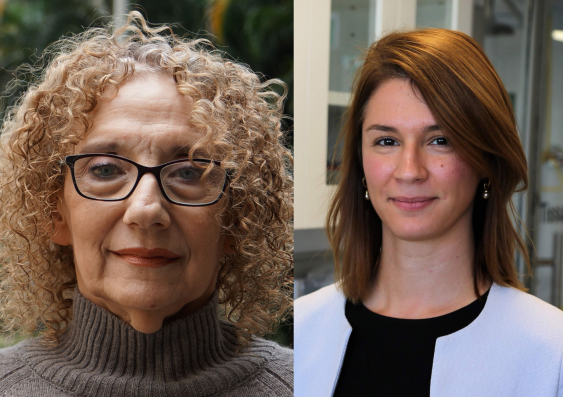UNSW academics recognised for excellence in cardiovascular research
Professor Kerry-Anne Rye and Associate Professor Jelena Rnjak-Kovacina took out both categories in the CVRN Ministerial Awards for Cardiovascular Research.
Professor Kerry-Anne Rye and Associate Professor Jelena Rnjak-Kovacina took out both categories in the CVRN Ministerial Awards for Cardiovascular Research.

Stefanie Menezes
External Communications
+61 2 9065 3225
s.menezes@unsw.edu.au
Two UNSW Sydney researchers who are applying a unique approach to the study of heart health have won the NSW Cardiovascular Research Network (CVRN) Ministerial Awards for Cardiovascular Research.
Professor Kerry-Anny Rye and Associate Professor Jelena Rnjak-Kovacina are to be applauded on their success, Deputy Vice-Chancellor, Research & Enterprise, Professor Nicholas Fisk said.
“Both academics are among our most gifted researchers in cardiovascular disease,” he said. “Prof. Rye has made a huge contribution to our understanding of the causes of coronary artery disease, in particular her lipidology work to improve its prevention and treatment. A/Prof. Rnjak-Kovacina’s work, meanwhile, is a seminal example of the impact tissue engineers are having on modern medicine.”
Ministerial Award for Cardiovascular Research Excellence
Professor Kerry-Anny Rye at UNSW Medicine and Health was awarded the Ministerial Award for Cardiovascular Research Excellence at a ceremony hosted by NSW Minister of Health Brad Hazzard on Wednesday night.
Prof. Rye was recognised for her extensive contribution to research in cardiovascular disease and the cardiovascular community over several years. Her research aims to improve the understanding of causes of heart disease and diabetes and to develop novel strategies for treating these disorders.
She was the first to report that the cardioprotective high density lipoproteins (HDLs) in human plasma – so-called good metabolism - inhibit inflammation in coronary arteries, and have anti-diabetic properties. This property has recently been recognised to be one of the main driving forces in heart disease.
“I’m truly honoured to be the recipient of this award in recognition of my long-term involvement in cardiovascular research and the cardiovascular research community,” Prof. Rye said.
“It’s a huge surprise to be recognised in this way. However, it’s important to be aware that this award is also in recognition of the wonderfully talented people I have worked with over the years. None of this would have been possible without them,” she said.
Prof. Rye also studies signal transduction pathways in multiple cell types - macrophages and endothelial cells for heart disease and pancreatic beta cells and skeletal muscle cells for diabetes. She works with novel animal models and state-of-the-art imaging techniques to identify new therapeutic targets for atherosclerosis and diabetes.
Ministerial Award for Rising Stars in Cardiovascular Research
Associate Professor Jelena Rnjak-Kovacina at UNSW Engineering was awarded the Ministerial Award for Rising Stars in Cardiovascular Research. Her field of work is biomedical engineering, specifically the bioengineering of cardiac patches for the treatment of damaged heart muscle following a heart attack.
“I am honoured to receive the 2021 Ministerial Award for Rising Stars in Cardiovascular Research,” A/Prof. Rnjak-Kovacina said.
“This award is a testament to the important work my team and I, and our collaborators have been doing over the years. We hope this work will contribute to the treatment options and quality of life for patients suffering from cardiovascular disease.”
Cardiovascular disease is the leading cause of mortality worldwide and there are currently no effective treatments for the damage caused to heart tissue because of myocardial infarction or heart attack.
Cardiac patches are cardiac tissue analogues grown in the lab and may be a viable, long-term alternative to treating heart attacks. Using biomaterials, A/Prof. Rnjak-Kovacina’s research aims to develop viable bioengineered tissues such as cardiac patches. Her vision is a future in which treatment solutions can be offered for patients suffering from cardiovascular disease by growing replacement tissues in the laboratory.
Cardiac patches would also have the potential to repair cardiac muscle of children born with congenital heart defects, as well as be used as in vitro models of the human myocardium to study heart development or test new pharmaceuticals.